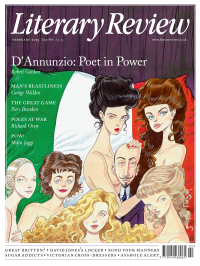Catherine Peters
Carry On Cross-Dressing
Fanny and Stella: The Young Men Who Shocked Victorian England
By Neil McKenna
Faber & Faber 396pp £16.99
Camp and drag, used to satirise accepted norms through parody, have a long and colourful history, as Neil McKenna’s lively account of a mid-Victorian scandal shows. Satire has always been a powerful tool for facing down repressive laws, but since the legalisation of homosexuality there has been a general belief that camp and cross-dressing as a form of rebellion would fade as the gay community became accepted. David Halperin has aroused a storm in queer studies by insisting in his recent book How to be Gay that camp is not only an essential and inextricable part of gay culture, but an important part of culture for everyone. In practice, cross-dressing and the reaction to it have always varied widely, and many transvestites are heterosexual. One of the characters at the centre of Neil McKenna’s study had a lover who hated him to drag up and refused to call him by his nom de guerre of ‘Stella’. Nevertheless, the 1860s seem to have been a time of particularly colourful camp exhibitionism, which became highly visible to Londoners when the case of Boulton and Park was heard at the Court of Queen’s Bench in 1871. In spite of Neil McKenna’s title, Victorian England at large seems to have been more fascinated than shocked by Fanny and Stella, and the case was reported, even in respectable newspapers, in relishing detail.
The ‘he-she ladies’, as they were dubbed, were two young men in women’s clothes arrested as they were leaving the Strand Theatre with two male companions. Ernest ‘Stella’ Boulton and Frederick ‘Fanny’ Park both came from respectable backgrounds (Park’s father was a judge). Victorian stereotypes are overturned when we learn

Sign Up to our newsletter
Receive free articles, highlights from the archive, news, details of prizes, and much more.@Lit_Review
Follow Literary Review on Twitter
Twitter Feed
Under its longest-serving editor, Graydon Carter, Vanity Fair was that rare thing – a New York society magazine that published serious journalism.
@PeterPeteryork looks at what Carter got right.
Peter York - Deluxe Editions
Peter York: Deluxe Editions - When the Going Was Good: An Editor’s Adventures During the Last Golden Age of Magazines by Graydon Carter
literaryreview.co.uk
Henry James returned to America in 1904 with three objectives: to see his brother William, to deliver a series of lectures on Balzac, and to gather material for a pair of books about modern America.
Peter Rose follows James out west.
Peter Rose - The Restless Analyst
Peter Rose: The Restless Analyst - Henry James Comes Home: Rediscovering America in the Gilded Age by Peter Brooks...
literaryreview.co.uk
Vladimir Putin served his apprenticeship in the KGB toward the end of the Cold War, a period during which Western societies were infiltrated by so-called 'illegals'.
Piers Brendon examines how the culture of Soviet spycraft shaped his thinking.
Piers Brendon - Tinker, Tailor, Sleeper, Troll
Piers Brendon: Tinker, Tailor, Sleeper, Troll - The Illegals: Russia’s Most Audacious Spies and the Plot to Infiltrate the West by Shaun Walker
literaryreview.co.uk